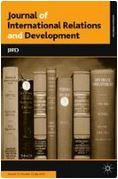The power of (emotion) words: on the importance of emotions for social constructivist discourse analysis in IR
Koschut, Simon – 2018
Constructivist approaches in International Relations (IB) often emphasise the importance of language for the construction of reality. the importance of language for the construction of reality, identity and power relations. power relations. In doing so, it is sometimes overlooked that the discursive exercise of power, e.g. through status differentiation, is based on collective emotions. power, for example through status differentiation, is rooted in collective emotions, which underpin and re-produce social discourses and identities at the international level. produce. It is argued here that the inclusion of emotions as an additional as an additional category of analysis for intersubjectivity, and that the questions and that the scope of the meanings that emerge from engagement with emotions the scope of the meanings that arise from the engagement with emotions is usually overlooked in constructivist discourse research. is overlooked. The article presents building blocks for emotion-based discourse research in the IB. discourse research in the IB. First of all, with the help of process sociology, it will be how certain categories of emotion strengthen international relations of power, but also but can also provoke resistance to social hierarchies in international relations. international relations. The theoretical-conceptual assumptions are subsequently are then examined with the help of emotion-based power figurations between the EU member states and the accession countries. Finally, the implications of the argumentation and a possible research agenda of social constructivist of social constructivist emotion research
